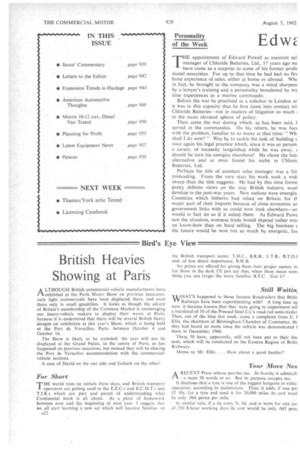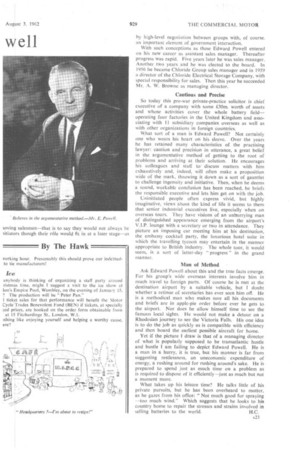Echiw
Page 24

Page 25

If you've noticed an error in this article please click here to report it so we can fix it.
well
THE appointment of Edward Powell as assistant sal manager of Chloride Batteries, Ltd., 17 years ago rm have come as a surprise to some of his former profe sional associates. For up to that time he had had no firs hand experience of sales, either at home or abroad. Win in fact, he brought to the company was a mind sharpen( by a lawyer's training and a personality broadened by wa time experiences as a marine commando.
Before the war he practised as a solicitor in London at it was in this capacity that he first dame into contact wi Chloride Batteries—not in matters of litigation so much in the more elevated sphere of policy.
Then came the war during which, as has been said, I served in the commandos. On his return, he was fact with the problem, familiar to so many at that time: " Wh shall I do now? " Was he to tackle the task of building t once again his legal practice which, since it was so persona career, of necessity languished while he was away, ( should he turn his energies elsewhere? He chose the latt alternative and at once found his niche in Chloric Batteries, Ltd.
Perhaps his title of assistant sales manager was a litt misleading. From the very start his work took a widi sweep than the title suggests. He had by this time forms pretty definite views on the way British industry won] develop in the post-war years. New nations were emergin Countries which hitherto had relied on Britain for tt major part of their imports because of close economic ar government links with us could now look elsewhere—an would in fact do so if it suited them. As Edward Powc saw the situation, overseas trade would depend rather moi on know-how than on hard selling. The big business I the future would be won not so much by energetic, fas loving salesmen—that is to say they would not always be titiators though their role would fit in at a later stage—as
by high-level negotiation between groups with, of course. an important element of government interaction.
With such conceptions as these Edward Powell entered on his new career as assistant sales manager. Thereafter progress was rapid. Five years later he was sales manager. Another two years and he was elected to the board. In 1956 he becarne Chloride Group sales manager and in 1959 a director of the Chloride Electrical Storage Company, with special responsibility for sales. Then this year he succeeded Mr. A. W. Browne as managing director.
Cautious and Precise So today this pre-war private-practice solicitor is chief executive of a company with some £30m. worth of assets and whose activities cover the whole battery field— operating four factories in the United Kingdom and associating with 11 subsidiary companies overseas as well as with other organizations in foreign countries.
What sort of a man is Edward Powell? Not certainly one who wears his heart on his sleeve. Over the years he has retained many characteristics of the practising lawyer: caution and precision in utterance, a great belief in the argumentative method of getting to the root of problems and arriving at their solution. He encourages his colleagues and staff to' discuss matters with him exhaustively and, indeed, will often make a proposition wide of the mark, throwing it down as a sort of gauntlet to challenge ingenuity and initiative. Then, when he deems a sound, workable conclusion has been reached, he briefs the responsible executive and lets him get on with the job.
Uninitiated people often express vivid, but highly imaginative, views about the kind of life it seems to them that senior industrial executives live, especially when on overseas tours. They have visions of an untrurrying man of distinguished appearance emerging from the airport's V.I.P. lounge with a secretary or two in attendance. They picture an imposing car meeting him at his destination, the embassy cocktail party, the luxurious hotel suite in which the travelling tycoon may entertain in the manner appropriate to British industry. The whole tour, it would seem, is a sort of latter-day " progress " in the grand manner.
Man of Method Ask Edward Powell about this and the true facts emerge. For his group's wide overseas interests involve him in much travel to foreign parts. Of course he is met at the destination airport by a suitable vehicle, but I doubt whether a retinue of secretaries has ever seen him off. He is a methodical man who makes sure all his documents and briefs are in apple-pie order before ever he gets to the airport. Nor does he allow himself time to see the famous local sights. He would not make a detour on a Rhodesian journey to see the Victoria Falls. His one idea is to do the job as quickly as is compatible with efficiency and then board the earliest possible aircraft for home.
Yet if the picture I draw is that of a managing director of what is popularly supposed to be transatlantic hustle arid bustle I am failing to depict Edward Powell. He is a man in a hurry, it is true, but his manner is far from suggesting restlessness, an uneconomic expenditure of energy, a rushing around for rushing around's sake. He is prepared to spend just as much time on a problem as is required to dispose of it efficiently—just as much but not a moment more.
What takes up his leisure time? He talks little of his private pursuits, but he has been overheard to mutter, as he gazes from his office: "Not much good for spraying —too much wind." Which suggests that he looks to his country home to repair the stresses and strains involved in
selling batteries to the world. H.C.
































































































